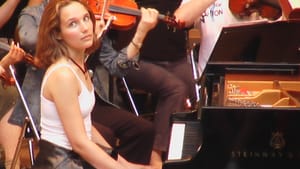Stay in the Loop
BSR publishes on a weekly schedule, with an email newsletter every Wednesday and Thursday morning. There’s no paywall, and subscribing is always free.
Grimaud meets the gruff German genius
Hélène Grimaud tackles Brahms (1st review)

Johannes Brahms may have been a musical genius, but his natural gifts couldn’t fully compensate for his lack of formal training. He refined his craft of composition over time, borrowing influences from Beethoven and his friend Schumann, and was intensely self-critical. Brahms didn’t start writing symphonies until his early 40s, although several orchestral works preceded the great four symphonies, including two Serenades, and the massive Piano Concerto No. 1.
Brahms fanatics are sometimes loath to admit it, but this lush concerto, written by a headstrong 20-something, is filled with clumsy constructions, not to mention an intense passion and extraordinary solo piano writing. I admire performances that don’t shy away from the music’s roughness, and that was the spirit that Hélène Grimaud brought to the score in her performance with the Philadelphia Orchestra. The superb French virtuoso relished in the brawn of the music and used its inherently gruff gestures to underline the tension as well as the callow, if honest emotion.
In the exposed solo passages, Grimaud drew out her phrases with great freedom, with a rhythmic flexibility that would have been self-indulgent under lesser hands. This was deeply poetic and thoughtful playing, as much a tribute to Grimaud’s artistry as to the rich expressivity of the music itself when interpreted with such daring.
Finesse be damned
The concerto’s orchestral writing is more problematic. Guest conductor Michael Tilson Thomas matched his soloist in his deliberate, full-throated sense for the music. Rather than try to smooth over the music’s rough patches— which consist mainly of difficult balances, both instrumentally and rhythmically— Thomas seemed to revel in the opulent ardor of the music, and damn the finesse.
One remarkable example of this approach was his highlighting of a signature solo voice of Brahms: the French horn. At times, the music sounded like a concerto for piano and horn. Was this an overstep on the part of Tilson Thomas? Who knows? Brahms simply wasn’t sophisticated enough as an orchestrator at this point in his career for his balances to be readily evident. And in any case, the opportunity to hear the gorgeous sonorities of the principal horn, Jennifer Montone, is always welcome.
Back to Earth
The concert’s second half was filled with a work that, in contrast to the Brahms, is a marvel of the art of orchestration, the Symphonie Fantastique by Berlioz. The music’s famously weird beauty is as much a result of the composer’s proto-psychedelic imagination as it is to the masterful blending of instrumental timbres, a skill Berlioz possessed nearly on the level of Mozart.
Tilson Thomas conducted the piece without a score, an obvious homage to his dedication to the work. And yet his deep knowledge of the music may have contributed to a somewhat fussy reading, in which the music’s flow was occasionally interrupted by a personal foray into a particular nook or cranny. It all sounded pretty, but I want to be carried away by a grand roar that breaks the common bounds of reality when I hear this piece. This performance stayed solidly earthbound.
To read another review by Steve Cohen, click here.
What, When, Where
Philadelphia Orchestra. Brahms, Piano Concerto No. 1; Berlioz, Symphonie Fantastique. Hélène Grimaud, piano; Michael Tilson Thomas, conductor. December 5-7, 2013 at Verizon Hall, Kimmel Center, Broad and Spruce Sts. (215) 893-1955 or philorch.org.
Sign up for our newsletter
All of the week's new articles, all in one place. Sign up for the free weekly BSR newsletters, and don't miss a conversation.
